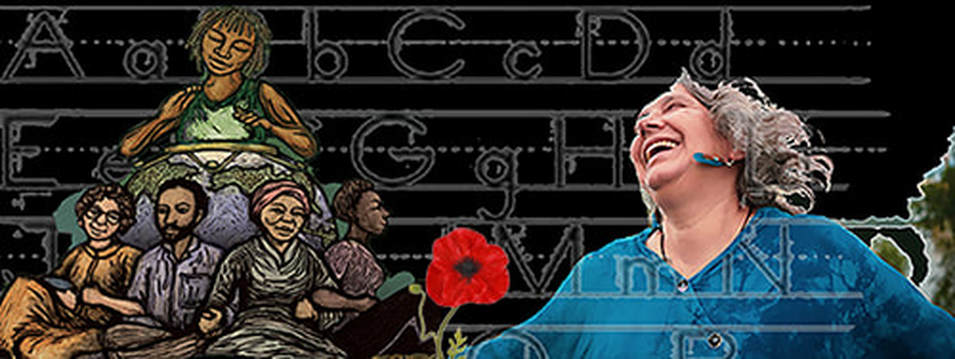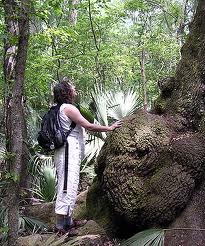|
It's been a long, deep time since I posted. On Saturday, May 7, our family ended the first phase of grieving with a public celebration of my mother's life. For a week before it, I spent hours going through treasure troves of photographs, many I hadn't seen before, and six hours scanning them into my computer so that my brother Alejandro could make a slide show for the celebration. That was the kind of task I was fit for. Everything else slipped rigght out of my mind, into the fog of absence and shock and disoriented exhaustion. Then we all got the stomach flu.
If it were not for a remarkable and loving friend, the celebration wouldn't have happened at all. Patty Berne, my beloved and very busy friend and the artistic director and general heart and motor of Sins Invalid offered to organize the entire event long distance, from Berkeley, and while my stunned family struggled to keep our heads above water, organized teams of volunteers with leaders, followers and task lists, dealt with caterers and made seating charts, so that there was nothing for us to do on the day itself but be there and receive, be there and speak. It was a gathering of poets. Kate Rushin, who frequently read with my mother in the heydey of her writing life, our companion from the heady days when This Bridge Called My Back was first released, agreed at the last minute to be our MC, and did it with grace and feeling. Denny Bergman, who was in a writing group with my mother for ten years, read both her own and my mother's poetry, starting the event off with probably my mother's best known piece, "I Am What I Am." And I read "Concepts of Pollution," my mothers enraged diatribe on anthropology, a tribute to her critical, radical mind and sharp, clear voice. Our dear friend and adopted family member Freda Hauser sent a letter about the gift of getting to have a mother by choice, of the things my mother, our mother, taught her. And many others stood and spoke about her impact on them. But the star of the show, the icing on the cake, the bright red cherry on top, was my mother's own voice, culled from her bedside rolodex and a little book my father prepared for one of her birthdays--a sampling of her wonderfully garbled sayings, labeled, in her elegant handwriting as "malaprops." My brother Ricardo suggested we put them on numbered cards and hand them out, and Kate called on people by number to stand and read them. "It takes two," she once declared, "to waltz to a tango." "As alike as two peas in a pod if there ever was one." "That's water over the hill." "Dead as a doorbell." She often combined two proverbs into some new and deliciously expressive declaration: "I don't know him from a hole in the head." (We all know people like that.) "Everything under the kitchen sink." "That's water over the hill." "It drove her up the garden wall." "Leave no hole unturned." And perhaps my favorite, "That's a fish of another kettle." I know that death alters the story. People focus on the delights, the gifts, and shy away from the struggles. My mother and I had long, difficult periods of our relationship. She was controlling and critical, and particularly harsh with me, her firstborn child and only daughter, and I was rebellious and sharp in return. In our grief, we can praise the control as assertiveness, and focus on the power of her critical mind to clarify, not the hurts we took from her sharp tongue. In the freshness of our loss, everything about her seems heroic. It will take time for the stories to sift and fall into place, for the rich complexity of her to fully emerge in what we say. It's a task I've taken on, my own path of mourning, to write her story. In September I'll return to Boston and while my father travels, I'll water the bromeliad and the hibiscus grown from smuggled cuttings from our farm, and surrounded by her notebooks and lists, her books and photographs, begin writing a memoir of my parents' lives. I won't evade the difficulties of her personality, but what shines now will still shine. She was infinitely curious about the world, and far more courageous than she could let herself know, facing into the wind of pompous men in her political and academic worlds, saying what she thought, putting her finger right on the flaw of any argument, and delighting in the odd and beautiful details of this world. (So many of the photographs I found show her laughing, face alight with joy.) And her mind was the sharpest instrument I've ever known. When I asked my father what he fell in love with, that weekend that they met in 1949, he said, "the sharpness of her questions," and our old friend Ruth Mahaney said it was my mother her taught her to trust her gut, that you didn't need to know exactly what was wrong, or what to replace it with, to say "Stop! Something about this is off." She says in political meetings, my mother's face was a barometer of the truth and accuracy of what was being said. They would look to her and if she was frowning, they'd say, "wait a minute," knowing that something wasn't quite right. Mami often said that she remembered how she felt more than what she'd done, one of the nasty impacts of sexism. It's only now, listening to my father's stories, that I'm learning the extent of what she did, how often she stood up, for and against, stood out, spoke up, made things happen, how often she asked the perfect question (it was her questions that helped steer my father from genetics to ecology,) followed her curiosity to a new expertise, invented and devised and took note. Literally. Her notebooks and file cabinets are full of information on everything from herbal remedies for a hundred ailments, to field notes for a guide to the bromeliads of Puerto Rico, from private memos on how not to spread despair or succumb to fearfulness, to pages covered with abstract designs and doodles where she began crafting her M.A. thesis, a powerful critique of anthropologist Claude Levi-Strauss. And yet she insisted, militantly, proudly, that she was ordinary, akin to the pigeons that swoop from ledge to gutter, eating the crumbs that fall from park bench lunches, "birds," she wrote, "of a common feather." She didn't believe in intellectual altitudes, in geniuses, in exceptionality--in anything that created classes of people above and below, so I can't, in good faith, apply any of those words to her. I'll just say this: My mama may have been a bird of a common feather, but she was also a fish of a different kettle.
0 Comments
Your comment will be posted after it is approved.
Leave a Reply. |
About Aurora
Aurora Levins Morales is a disabled and chronically ill, community supported writer, historian, artist and activist. It takes a village to keep her blogs coming. To become part of the village it takes, donate here. Never miss a post!
Click below to add this blog to your favorite RSS reader: Archives
September 2017
Categories
All
|


 RSS Feed
RSS Feed
